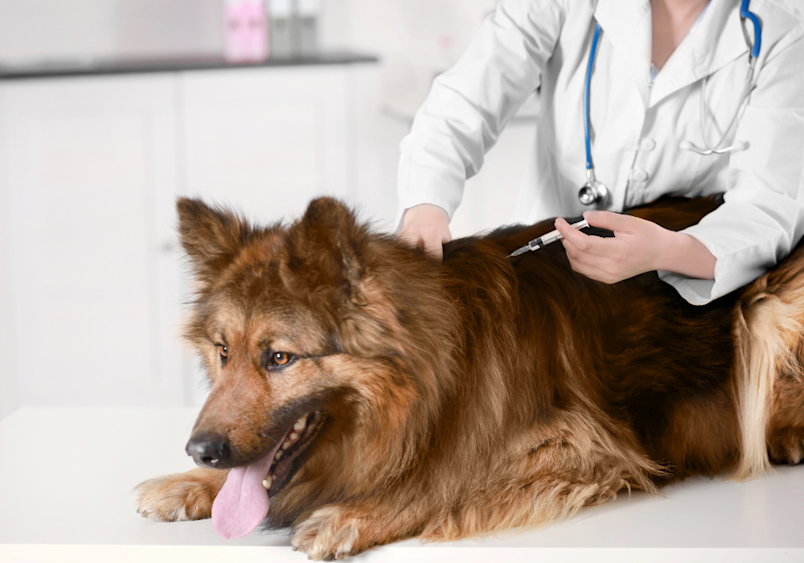
Bringing home a new puppy is one of life’s greatest joys. Those wagging tails, playful pounces, and endless cuddles make every day brighter. But as a responsible pet parent, you also need to think about protecting your furry bundle of energy from hidden dangers. Just like human babies, puppies need a strong defense against diseases, and that’s where a well-planned puppy vaccine schedule comes in. Vaccinations are the cornerstone of your pup’s long-term health, shielding them from preventable illnesses that could otherwise turn serious—or even fatal.
It can get a bit confusing, but don’t worry, we’ll walk you through everything you need to know about dog vaccinations, from core vaccines to the 5-in-1 vaccine for puppies schedule, and how often your adult dog will need boosters. By the end, you’ll feel confident navigating your pup’s healthcare.
Why Vaccinations Are Important for Your Puppy
You know how your puppy investigates everything with their nose and mouth? This natural curiosity, while adorable, exposes them to potentially harmful pathogens. Vaccinations work by stimulating your puppy's immune system, allowing it to recognize and fight off specific infections before they take hold.
Young puppies initially receive antibodies from their mother's milk, providing them with temporary immunity. However, this protection wanes between 6-12 weeks of age, leaving them vulnerable to diseases during a critical development period. This is precisely when a structured puppy vaccine schedule becomes essential.
Think of vaccines as a training program for your puppy's immune system. When your pup receives a vaccine, their body is introduced to a harmless version of a disease. This teaches their immune system to create protective antibodies (specialized proteins that identify and neutralize threats) without causing illness. Later, if they encounter the real disease, their body already knows how to fight it off.
The stakes couldn't be higher. Diseases like parvovirus can attack your puppy's intestines with devastating effects, causing severe dehydration and carrying a mortality rate up to 91% in untreated cases. The heartbreaking reality is that many of these diseases have no cure, only supportive care. A simple puppy shot schedule dramatically reduces these risks and can mean the difference between a healthy puppy and a medical emergency.
Beyond protecting your individual pet, vaccinations contribute to something called herd immunity. When most dogs in your community are vaccinated, infectious diseases have nowhere to go, which helps protect vulnerable puppies too young for vaccines and dogs with compromised immune systems.
What Vaccines Do Dogs and Puppies Need?
Vaccines for dogs fall into two categories: core vaccines (essential for all dogs regardless of lifestyle) and non-core vaccines (recommended based on risk factors and geographical location).
Core Vaccines
These vaccines protect against serious, widespread diseases that pose significant health risks to all dogs, regardless of breed or environment:
Distemper Virus
This highly contagious virus is like a multi-system attack on your puppy's body. It starts with respiratory symptoms (coughing, discharge) before potentially spreading to the digestive tract and even the nervous system, causing seizures or paralysis. Without the distemper vaccine for dogs, this disease can be deadly, especially for puppies. The vaccine provides excellent protection for up to three years after the initial series and first-year booster.
Adenovirus (Canine Hepatitis)
Think of this as a virus that targets your dog's internal filtering system—primarily the liver. Infected puppies develop fever, abdominal pain, and in severe cases, bleeding disorders. The good news? The vaccine offers robust protection for up to three years after completing the initial series and one-year booster.
Parvovirus
This is perhaps the most feared puppy disease, and for good reason. Parvo attacks rapidly dividing cells in your puppy's intestines, causing severe vomiting and bloody diarrhea. Understanding how puppies get parvo - through contact with contaminated feces, soil, or surfaces - helps explain why unvaccinated puppies are so vulnerable.
Without treatment, the mortality rate is devastating in puppies. One day your puppy is playful; the next, they're fighting for their life. The vaccine provides strong, lasting protection against this aggressive virus; and like other core vaccines lasts for up to three years after initial boosting.
Rabies
This fatal virus doesn't just threaten your dog—it's also dangerous to humans, which is why the rabies vaccine is legally required across most of the United States. Once symptoms appear, rabies is almost always fatal. Initial vaccination happens around 12-16 weeks, with boosters following according to your state's laws (either annually or every three years).
Parainfluenza Virus
While not usually deadly, this respiratory virus can make your puppy miserable with a persistent, hacking cough that can last for weeks. It's a key contributor to "kennel cough" syndrome. The vaccine reduces symptom severity and protects for up to three years following the initial series and booster.
While often included in core combination vaccines like DHPP and recommended by many organizations such as the American Animal Hospital Association, Canine Parainfluenza is not universally classified as a core vaccine by all veterinary guidelines.
Non-Core Vaccines
These vaccines are recommended based on your dog's lifestyle, environment, and geographical location:
Leptospirosis
This sneaky bacterial infection spreads through contaminated water or soil—think puddles, lakes, or damp areas visited by wildlife. It attacks the kidneys and liver and can transfer to humans. If your puppy loves swimming, hiking, or you live in a rural or rainy area, your vet will likely recommend this vaccine, which requires annual boosters. The leptospirosis vaccine requires two initial doses 2-4 weeks apart and provides protection for approximately one year.
Bordetella (Kennel Cough)
If your dog is social—attending daycare, boarding facilities, or training classes, and even grooming sessions—this vaccine is typically required. It protects against a contagious respiratory infection that spreads like wildfire wherever dogs gather. Protection typically lasts 6-12 months, depending on whether your puppy receives the nasal spray or injection form.
Lyme Disease
Does your area have ticks? This Lyme disease vaccine protects against a bacterial infection transmitted by these tiny parasites. Symptoms include joint pain, fever, and lethargy that can progress to kidney failure if untreated. It's primarily recommended for dogs in the Northeast, Upper Midwest, and Pacific Northwest, where Lyme disease is common.
Canine Influenza
Just like human flu, dog flu is highly contagious and causes coughing, sneezing, and lethargy. There are two main strains currently in the United States (H3N8 and H3N2). The vaccine requires two initial doses followed by annual boosters and is recommended for dogs that socialize frequently at parks, daycares, or boarding facilities.
Your veterinarian can give you recommendations based on your local disease risks and your puppy's specific lifestyle—whether they're a hiking companion, a social butterfly at the dog park, or primarily an indoor cuddle buddy.

Puppy Shot Schedule
Every puppy’s needs are unique, so your vet will help tailor a personalized vaccine schedule, but a typical puppy vaccine schedule might look like this:
6-8 Weeks
First round of DHPP: (Distemper, Hepatitis/Adenovirus, Parainfluenza, Parvovirus)
Bordetella (if planning for puppy socialization classes)
10-12 Weeks
Second DHPP
Leptospirosis (first dose, if recommended)
Lyme disease (first dose, if recommended)
Canine influenza (first dose, if recommended)
14-16 Weeks
Third/Final DHPP booster
Rabies
Leptospirosis (second dose, if recommended)
Lyme disease (second dose, if recommended)
Canine influenza (second dose, if recommended)
12-16 Months
DHPP booster
Rabies booster
Annual non-core vaccine boosters as needed
Puppy vaccinations start early (around 6-8 weeks) because the natural protection from their mother gradually decreases, but at an unpredictable rate. The initial vaccines begin stimulating the puppy's own immunity while some maternal antibodies are still present. The subsequent boosters ensure protection kicks in as that maternal immunity fades, covering the vulnerable period.
For your puppy's safety, it's best to avoid high-risk areas like dog parks, pet stores, and sidewalks frequented by unknown dogs until at least 2 weeks after their final vaccination. This gives their immune system time to build full protection before facing potential exposure to diseases.
Adult Dog Vaccine Schedule
Once your puppy transitions to adulthood, maintaining their immunity through regular boosters remains important. After the initial puppy series and one-year boosters, the schedule typically becomes:
Core Vaccines (Every 1-3 Years)
DHPP (often given as a 3-year vaccine after the first booster)
Rabies (1-3 years, depending on state law and vaccine type)
Non-Core Vaccines (Annually)
Leptospirosis
Bordetella (every 6-12 months for social dogs)
Lyme disease (for dogs in endemic areas)
Canine influenza (for at-risk dogs)
Your veterinarian will recommend the appropriate interval based on your dog's risk factors, lifestyle, and the specific vaccines used. Some veterinary practices are moving toward antibody titer testing which is a blood work to check immunity levels to determine if revaccination is necessary, potentially reducing over-vaccination while ensuring adequate protection.
The Significance of the 5-in-1 Vaccine for Puppies
You may hear your veterinarian mention a "5-in-1" vaccine during your puppy's appointments. This combination vaccine (sometimes called DHPP or DHLPP) protects against multiple diseases in a single injection:
D: Distemper
H: Hepatitis (Adenovirus)
L: Leptospirosis (when included)
P: Parainfluenza
P: Parvovirus
The 5-in-1 vaccine simplifies the puppy shot schedule, ensuring comprehensive coverage with fewer injections. This means less stress for your puppy while still providing protection against the most common and dangerous diseases.
The administration schedule typically follows the pattern mentioned earlier (6-8 weeks, 10-12 weeks, 14-16 weeks, and 12-16 months), with subsequent boosters every 1-3 years. This combination vaccine forms the backbone of most puppy vaccination protocols.
How Often Do Dogs Need Shots After Puppyhood?
The frequency of vaccines after your dog reaches adulthood depends on several factors:
Core Vaccines: After completing the puppy series and one-year booster, most core vaccines provide protection for three years. Your veterinarian may recommend a three-year schedule for DHPP and rabies (where legally permitted).
Non-Core Vaccines: These typically require annual boosters to maintain protection:
Leptospirosis: Annual
Bordetella: Every 6-12 months for at-risk dogs
Lyme disease: Annual for dogs in endemic areas
Canine influenza: Annual for social dogs
Several factors influence your adult dog's vaccine needs:
Age: Senior dogs may have different vaccination requirements due to changing immune responses
Lifestyle: Dogs that hike, swim, attend daycare, or visit dog parks face different risks
Geographic location: Certain diseases are more prevalent in specific regions
Health status: Dogs with compromised immune systems may need adjusted schedules
Always consult with your veterinarian to create a personalized vaccination plan that meets your dog's specific needs while avoiding unnecessary vaccinations.

How Much Do Puppy and Dog Vaccines Cost?
The cost of vaccinations varies depending on your location, veterinary practice, and whether you're getting individual or combination vaccines. Here's a general price range to help you budget:
Core vaccine packages (DHPP): $75-$100 per visit
Rabies vaccine: $15-$35 (when administered separately)
Bordetella: $20-$45
Leptospirosis: $20-$40
Lyme disease: $20-$40
Canine influenza: $25-$45
Some clinics offer puppy packages that include all recommended vaccines at a discounted rate. Additionally, many animal shelters and community organizations host low-cost vaccination clinics that can significantly reduce these expenses.
While these costs may seem significant, especially with multiple puppy visits, consider them an investment in your dog's lifelong health. Treating preventable diseases is substantially more expensive than vaccination, not to mention the emotional toll of watching your pet suffer.
Common Side Effects or Adverse Reactions to Vaccines
Most puppies tolerate vaccines well, with only mild, temporary reactions. However, being aware of possible side effects helps you respond appropriately if they occur.
Common Mild Reactions Include:
Mild lethargy or sleepiness for 24-48 hours
Reduced appetite
Slight swelling or tenderness at the injection site
Low-grade fever
These reactions typically resolve on their own within a day or two and represent your puppy's immune system responding appropriately to the vaccine.
Less Common but More Serious Reactions May Include:
Facial swelling
Hives or significant itching
Vomiting or diarrhea
Collapse or fainting
Difficulty breathing
If you notice any of these more severe reactions, contact your veterinarian immediately. They represent allergic responses that require prompt medical attention.
To minimize vaccine reactions, schedule vaccinations when you can monitor your puppy for the next 24-48 hours and avoid strenuous activity on the same day. If your puppy has had reactions in the past, your veterinarian may recommend pre-treating with antihistamines or spreading out vaccinations to reduce the risk of complications. Always discuss your puppy’s health history before vaccinations to ensure the safest approach.
Pet Insurance and Vaccines
Watching your puppy receive those crucial vaccines against parvo, distemper, and rabies is a powerful reminder of how vulnerable our pets can be. While these vaccinations provide essential protection, they represent just the beginning of your puppy's lifetime healthcare journey. Even the most diligently vaccinated pets can face unexpected health challenges—from broken bones to cancer diagnoses—that no preventative care can anticipate.
Pet insurance provides peace of mind when facing these unpredictable situations. When your normally energetic puppy suddenly becomes lethargic or your adult dog develops mysterious symptoms, the last thing you want is cost influencing your decisions about diagnostics or treatment. Without coverage, pet parents often face difficult choices when emergency surgeries or specialized treatments run into thousands of dollars. The most important thing to know? Insurance plans don't cover pre-existing conditions, so enrolling your puppy now—while they're young and healthy—ensures they'll have coverage for conditions that might develop later in life.
Many pet parents find additional value in wellness programs that complement traditional insurance. These optional add-ons help manage predictable expenses like those puppy vaccines, annual boosters, dental cleanings, and preventative medications. Wellness plans can help reimburse you for routine care while your insurance handles the unexpected. This comprehensive approach creates a financial safety net that supports your puppy through every life stage—from those first crucial vaccines to senior care and everything in between.
Setting Your Puppy Up for a Healthy Future
Adhering to a comprehensive puppy vaccine schedule is one of the most important steps you can take to protect your new furry family member. By understanding the importance of each vaccine, following a personalized schedule, partnering with your trusted veterinarian, and getting appropriate pet insurance coverage, you're giving your puppy the best chance at a long, healthy life. The time and resources you invest in your puppy's health now will reward you both with years of tail wags, adventures, and unconditional love.
Common Questions About Dog Vaccinations
Can my puppy socialize before completing all vaccinations?
While protecting your puppy from disease is important, socializing your dog during the critical window (before 16 weeks) is equally essential. Discuss safe socialization options with your veterinarian, such as puppy classes that require proof of vaccination or arranging playdates with fully vaccinated dogs in clean environments.
What if I adopt an adult dog with unknown vaccination history?
Most veterinarians will recommend starting with core vaccines and possibly treating the dog as unvaccinated. Your vet might suggest antibody titer testing to determine if your dog already has immunity to certain diseases.
Can vaccines be given if my puppy is slightly ill?
Minor issues like mild dental tartar or dry skin typically don't interfere with vaccination. However, puppies with fever, lethargy, vomiting, or diarrhea should recover before receiving vaccines. Always inform your veterinarian about any health concerns before vaccination.
Are there alternatives to traditional vaccination schedules?
Some veterinarians offer titer testing to measure antibody levels before revaccination. This approach can reduce unnecessary boosters while ensuring your dog remains protected. Discuss this option with your veterinarian if you're concerned about over-vaccination.
What if I miss a vaccination appointment?
Contact your veterinarian as soon as possible. Depending on how much time has passed, they may recommend restarting the series or simply continuing with the next scheduled dose. The approach varies based on the specific vaccine and your puppy's age.
Can vaccines cause long-term health problems?
Serious adverse events from vaccines are extremely rare. The benefits of protection against potentially fatal diseases far outweigh the minimal risks associated with vaccination. If you have concerns, discuss them openly with your veterinarian.